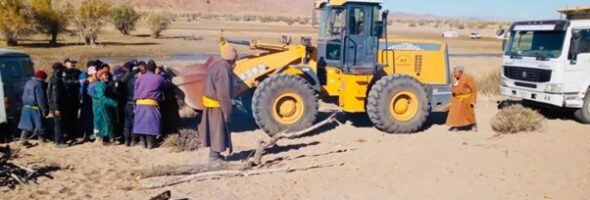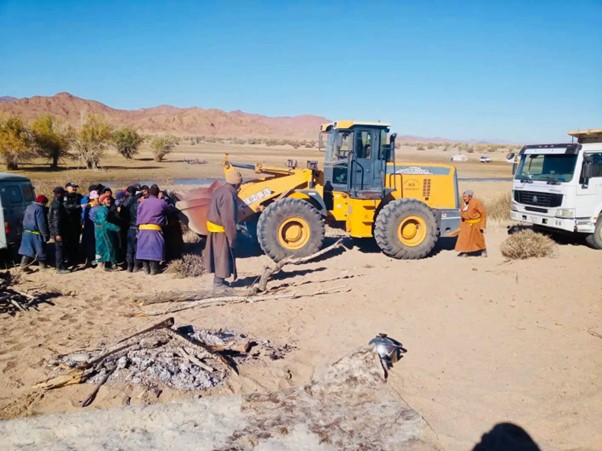
On October 4 a video of local herders protesting the Erdeneburen hydroelectric power plant construction in Uvs Province’s Umnogovi sum was circulated online. It shows men, women, elderly and children preventing the passage of heavy machinery despite being harassed by several policemen. As predicted by human rights NGOs the population of Uvs Province’s Umnogov sum Ulyast Bagh have started to protest against the work of Erdeneburen HPP, which is threatening to deprive them of their ancestral lands.
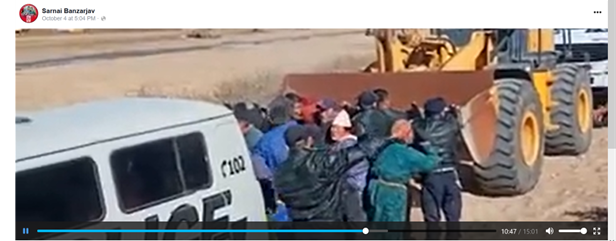
As the video went viral, Ch. Gantulga, the project leader of the Erdeneburen hydropower plant project gave an interview in which he promised to use more force to suppress local protest. According to Gantulga, Erdeneburen HPP preparation work has been completed and the ground drilling work has started (Usually this activity is a part of the project preparation, helping to assess the feasibility of dam building -here and further RwB comment). Drilling took place in nine locations in Erdeneburen and Miangad Sum of Hovd Province over the last 45 days. As of October 3rd, the drilling work was set to start at the location “where the HPP dam tunnel will pass through the Ulyast Bagh area of Uvs Province, Umnogov Sum”. The work requires a large drilling rig, excavators, bulldozers, etc., and includes the development of temporary roads. The project team, engineers and technical workers of the Chinese state-owned company that won an international tender, as well as members of the police department of Uvs province center, and the police of the Umnogov sum department were all moving to the site accompanying this machinery (Presence of police indicates that they expected to meet some resistance).
On October 4 the people of the area protested against the entry of equipment and experts into the Shizhigt Gorge (In 2011 Khovd River basin management plan WWF experts recommended that the area be protected as a biodiversity conservation area). The land for the construction of the HPP was taken by the Government of Mongolia for special needs of the state two years ago (without any free prior informed consent of the land inhabitants). The advance of the machinery has stopped as protesters did not yield to bulldozers and police.
From Gantulga’s perspective, those actions of “people who do not have certificates of ownership of land acquired for special needs of the state” are trying to disrupt important and strategic large-scale development and thus acting illegally. He claims that over the past year, his subordinates have negotiated with citizens, held meetings, and evaluated their real estate. In April 2022, the government made a decision to provide one-time cash compensation to each affected citizen within the framework of work to keep the livelihood of the citizens “normal”.
Gantulga claims that his project will “further the energy independence and independence of Mongolia” (An additional large debt to China is hardly a step towards “independence”). He laments that citizens are disrespecting the law and risking their lives organizing a riot. However, “12 policemen are not strong enough” to suppress the citizens, so, to push forward a major project under the government’s policy, they will request deployment of more force and take “appropriate measures”.
Having his own understanding of law, Gantulga accused locals of “illegal actions in the past” such as calling on the head of the government to deliberately stop or delay the project, writing letters “to create misunderstandings between the two countries”, or inviting the population of other affected areas to join the protest (All those actions are a manifestation of basic civil rights and thus cannot be considered illegal).
It is important to remember that two months ago the Minister of Justice Nyambaatar announced that anyone who expresses doubts, or acts or makes statements that result in delayed implementation of strategic development projects will be charged with sabotage under Mongolia’s Criminal Code Article 19.6. In addition, the government has established a task force to investigate and calculate cost of lost opportunity from those responsible for the delay in the implementation (see detailed account of earlier steps taken by the government).
On October 6, a press conference was held in Ulaan Baatar where project official Ch.Gantulga and Ts.Sosorbaram, a soviet-school water engineer responsible for the project EIA, tried to explain that the “project can proceed smoothly”.
Regarding the resettlement Ch.Gantulgaclarified what cash allowances are going to be given to citizens. He said, “According to Government Resolution No. 357 of 2019, 28 thousand hectares of land for the implementation of the Erdeneburen HPP project was taken for special state needs. Before the 2019 decree was issued, 270 households or 1241 citizens were registered in the affected area. In April 2022, the government decided to provide money to those citizens. Therefore, compensation of 15.2 million MNT will be provided to 1240 citizens of 270 registered households. This money has been included in the budget” (Thus each person will get roughly USD 4500 in a one-time disbursement, which may be not enough to restore their livelihoods).
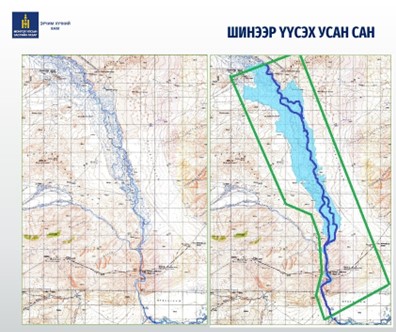
The official list includes 145 households of Bayan-Olgi province and 125 households of Uvs province. According to the EIA, a plan was made to relocate these families in 2022-2024. The government plans to make herdsmen move to neighboring soums and even to build some resettlement housing for them in one place. Compensation will be given to citizens who move.
Judging from available information it is a “Chinese-style” resettlement in which indigenous nomads are forced to concentrate in one place, while pasture for their livestock may be not available there. Further, emphasis on “registered households” makes one suspect that, as in many other cases, there could be a greater number of nomadic families who are using the area according to traditional hereditary rights, but do not have legal registration. As the sad experience with the recently built 11MW Taishir Hydro shows, many people may be forced to change their lifestyle dramatically and migrate to suburban ger districts of Ulaan Baatar or other towns, since without restoring their livestock economy they will have no means to survive in the countryside in the long term.
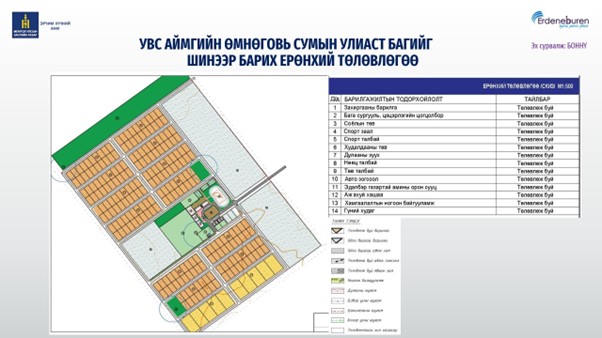
All in all, the situation is developing according to the worst scenario predicted by RwB and human rights groups: local people are coerced to give up their land, culture, and lifestyle with compensation that is likely insufficient to restore their livelihoods elsewhere. When they protest to protect their ancestral lands, the government criminalizes their act and threatens to bring in more police to suppress them. Anyone helping protesters to express their concerns is threatened by criminal investigation and exorbitant fines.
According to local sources 1 man and 3 women, who participated in October 4 events, have been officially accused of “organizing illegal protest” by police.


